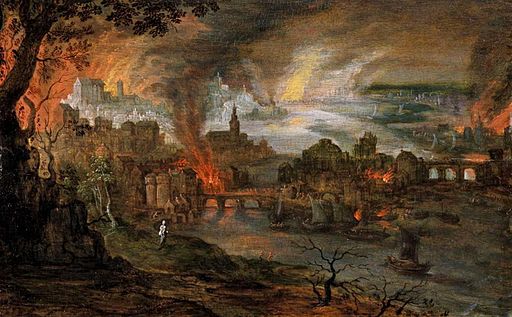 Does Torah’s narrator dislike Lot of Sodom, nephew of Abraham? Or does she feel sorry for him? Does she think we should, too?
Does Torah’s narrator dislike Lot of Sodom, nephew of Abraham? Or does she feel sorry for him? Does she think we should, too?
The narrator, of course, is circumspect. Literally. She circles around Lot’s story. Turn by turn, she introduces him.
Orphaned as a young child
Terach fathers Abram, Nachor and Haran. Haran fathers Lot, and dies. (Gen. 11:27-28).
Family foster child, passed from grandfather to uncle
Later, Grandpa Terach moves to a new city. He takes Abram, Lot, and Abram’s wife Sarai with him (Gen. 11:31). Time passes. God tells Abram to move again. When Abram goes, Lot goes with him (Gen. 12:4). Alternatively, Abram takes his wife Sarai, his nephew Lot, his property, and his people (Gen. 12:5).
Does Lot go of his own free will? Or must he move when his guardian moves?
Argumentative young man
Lot’s shepherds quarrel with Abram’s shepherds. And with the local shepherds (Gen. 13:7). Abram says, “Let there not be a quarrel between me and you, or between my shepherds and your shepherds” (Gen. 13:8).
Do the shepherds, surly outdoorspeople working for minimum wage, quarrel? Or does Lot quarrel directly with Abram, perhaps when Abram tries to mediate?
Self-centered and greedy
Abram suggests that the men separate. He invites Lot to choose his preferred grazing lands. Lot looks out at the Jordan valley, so lush – before God destroys Sodom, that is. So, Lot chooses the whole valley (Gen, 13:9-11).
Do I need to highlight Lot’s choice of the entire good grazing land? Why does Abram simply agree? Does he pity Lot, or is he eager to get rid of Lot?
Comfortable with a difficult crowd
Lot pitches his tent in various cities, until he arrives in Sodom. The people of Sodom are awful and sinful (Gen. 13: 12-13).
Why does Lot choose Sodom as his home?
In trouble again; saved again by his uncle
The king of Sodom and his allies are defeated in battle. The victors confiscate all of Sodom’s wealth. They take Lot and Lot’s property too (Gen. 14:12). Abram hears about it, assembles an army, and liberates all the spoils – including Lot and his property (Gen 12:16).
Why does Abram risk his life to save Lot – and Lot’s property? How deeply does Lot identify with his own wealth?
Ungrateful
Melchizedek the priest blesses Abram (Gen 14:19). The King of Sodom tries to pay Abram – though Abram refuses the money (Gen 14:21-23).
Why is there no mention of Lot saying “thank you?”
Abusive father
Lot greets two men at the gate of Sodom. He offers them hospitality for the night. They decline; he insists (Gen. 19:1-3). A mob surrounds Lot’s house, yelling. “Send out your guests, we want to get to know them,” they say, using a euphemism for rape (Gen. 19:4-5). Lot steps outside, and offers his daughters instead (Gen. 19:8).
Did you hope, for a moment, that Lot had changed? That he had not become “Lot of Sodom?” When you realized he had, did you wonder why he welcomed the guests? What did he hope to gain? And why did he offer his daughters to the mob? Why doesn’t he know how to be a father?
Lot of Sodom: A representative resident
This is Lot, the only resident of Sodom we get to know. He’s an orphan raised in foster care. An unwilling immigrant finding his way. We understand how his trauma led him to Sodom.
What about the other residents of Sodom? Does each one have their own sad story? Is the famed evil city just a collection of suffering individuals? Or can a society itself be evil?
Read a reflection on Sodom’s evil culture here. For an overview of Parshat Lech-Lecha (Gen. 12:1-17:27), click here.


I love the way you pulled Lot’s story out and in so doing gave us a fuller view of him.
Thanks, Jennifer! Following the threads is one of the great techniques of literary interpretation of Torah that I learned from Robert Alter and Joel Rosenberg. Shabbat shalom!